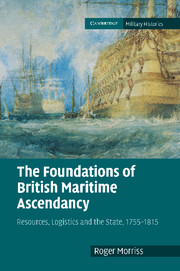Book contents
- Frontmatter
- Contents
- List of tables
- Preface
- Glossary of British weights, measures, casks and money values
- List of abbreviations
- Introduction
- 1 The British state in evolution
- 2 Defence and expansion
- 3 Economy and finance
- 4 Naval growth and infrastructure
- 5 Ordnance and technology
- 6 Manpower and motivation
- 7 Foodstuffs and victualling
- 8 Shipping and transportation
- 9 The supply of land forces overseas
- Conclusion
- Bibliography
- Index
Preface
Published online by Cambridge University Press: 10 January 2011
- Frontmatter
- Contents
- List of tables
- Preface
- Glossary of British weights, measures, casks and money values
- List of abbreviations
- Introduction
- 1 The British state in evolution
- 2 Defence and expansion
- 3 Economy and finance
- 4 Naval growth and infrastructure
- 5 Ordnance and technology
- 6 Manpower and motivation
- 7 Foodstuffs and victualling
- 8 Shipping and transportation
- 9 The supply of land forces overseas
- Conclusion
- Bibliography
- Index
Summary
Britain emerged from the wars between 1755 and 1815 with the world's greatest overseas empire; with the reputation of a great military power; and with trade and industry that culminated in the world's first industrial revolution. Britain's maritime ascendancy in the period 1755–1815 has been vital to the formation of the British national identity. Much has been written about its achievement. Contemporary mercantilists pointed out the importance of colonies and of seaborne trade for an island state. Nineteenth-century naval officers claimed a ‘natural naval superiority over…continental neighbours whose habits and feelings are drawn more particularly to land operations’. More recently, great importance has been attached to Britain's financial system at a time when, to contemporaries, ‘security, trade, empire and military power really mattered’. Colonies, naval power and money were all visible and vital manifestations of power. This book looks for the nexus of that power in the organisation of the state and the culture of its servants.
In seeking that central source of Britain's power, this book examines ‘the logistics’ of British maritime ascendancy. This word is now commonly used with regard to the provision of a chain of supply. Before the mid twentieth century, it was little used. Neither ‘logistics’ nor the word ‘supply’ appear in the index of C. Oman's book on Wellington's Army, written before the First World War. Indeed, indicative of the contemporary order of interest, Oman's chapter on the army Commissariat comes after those on uniforms and weapons.
- Type
- Chapter
- Information
- The Foundations of British Maritime AscendancyResources, Logistics and the State, 1755–1815, pp. xi - xiiiPublisher: Cambridge University PressPrint publication year: 2010

